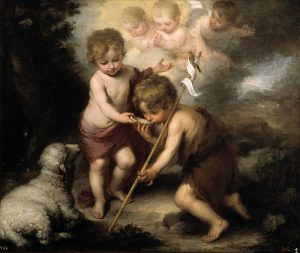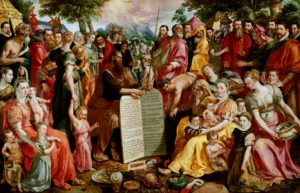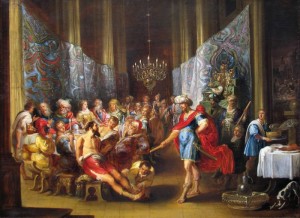Thoughts on Sunday’s Lessons for Oct. 1, 2023
First Reading (Track One): Exodus 17:1-7

The Holy Children with a Shell (John the Baptist on the right with the child Jesus.) Painting c.1670 by Bartolomé Esteban Perez Murillo (1617-1682). Prado Museum, Madrid. (Click image to enlarge.)
The people in their journey through the desert continue being hard to satisfy, quarreling with Moses and doubting whether God is really watching over them. In last week’s reading we saw God responding to their hunger with daily rations of quail and manna. Now they have no water, and even if their whining seems to annoy Moses, it’s hard to blame them for grumbling in their thirst. God instructs Moses to go ahead with some of the elders to strike a rock with the rod that he had used to part the Red Sea’s waters. He complies, and when he hits the rock, water comes gushing out to slake everyone’s thirst.
First Reading (Track Two): Ezekiel 18:1-4, 25-32
Three weeks ago we heard the Prophet Ezekiel warning the people that although God does not want to kill them, they surely must die if they do not repent, turning back from their wicked ways. Today, we hear a similar, longer exhortation from earlier in the book, another stern warning that contains a glimpse of hope. Again Ezekiel sees repentance as the necessary response to a dangerous pattern of behavior: Fail in righteousness, refuse to be just, and you must die. But repent, turn away from wickedness, and enjoy life in the grace of God, who takes no pleasure in your death or that of your children. “Turn, then, and live.”
Psalm (Track One): Psalm 78:1-4, 12-16
Writing centuries after the ancestral story of the people’s exodus from Egypt and their journey through the wilderness to freedom, the Psalmist joyfully recalls that narrative with no hint of the quarrelsome, complaining times when the people forgot God’s blessings. In this hymn of praise that “declares the mysteries of ancient times,” these verses echo to future generations how God’s power and marvels opened the sea, led the people toward freedom, and, indeed, brought water gushing out of a cliff like a river.
Psalm (Track Two): Psalm 25:1-8
The five or six Psalms that follow immediately after the beloved 23rd Psalm also sing praise and gratitude to a loving God who cares for us and protects us from our enemies. Echoing the ideas that Ezekiel expressed, when we sing this Psalm we remember that, though we may have sinned, transgressed God’s love and hopes for us, we nevertheless trust in our loving, saving God to remember us with compassion, protect us, and guide us toward right paths in spite of our errors.
Second Reading: Philippians 2:1-13
We hear more of Paul’s beautiful letter to his dear friends, the Philippians, from his prison cell in Rome. Be encouraged and consoled by the life and love of Christ, he exhorts them. Be as humble and unselfish as Jesus, placing the needs of others before our own ambition; and in doing so, live as Jesus lived. Then he turns to the poetic phrases of an ancient Christian hymn, proclaiming that Jesus – although made in the form of God – “emptied himself” in utter humility, taking instead the form of a slave, obediently accepting death by crucifixion; and in so doing became exalted as our anointed Lord and master.
Gospel: Matthew 21:23-32
We have skipped over several chapters and a great deal of activity since last week’s Gospel. Jesus and his disciples have reached Jerusalem, entered the city with palm-waving, cheering crowds, and angrily thrown over the money changers’ tables in the temple. Now it is a new day, Jesus has come back to the temple, and the wary high priests try to trap him by asking with whose authority he teaches, heals and speaks. But Jesus traps them back with his own trick question about John the Baptist that they can’t answer either way without getting into trouble. Then Jesus moves on to a parable that, as parables do, asks a thought-provoking question: Is it better to walk the walk or talk the talk?
What are “Track 1” and “Track 2”?
During the long green season after Pentecost, there are two tracks (or strands) each week for Old Testament readings. Within each track, there is a Psalm chosen to accompany the particular lesson.
The Revised Common Lectionary allows us to make use of either of these tracks, but once a track has been selected, it should be followed through to the end of the Pentecost season, rather than jumping back and forth between the two strands.
For more information from LectionaryPage.net, click here.



